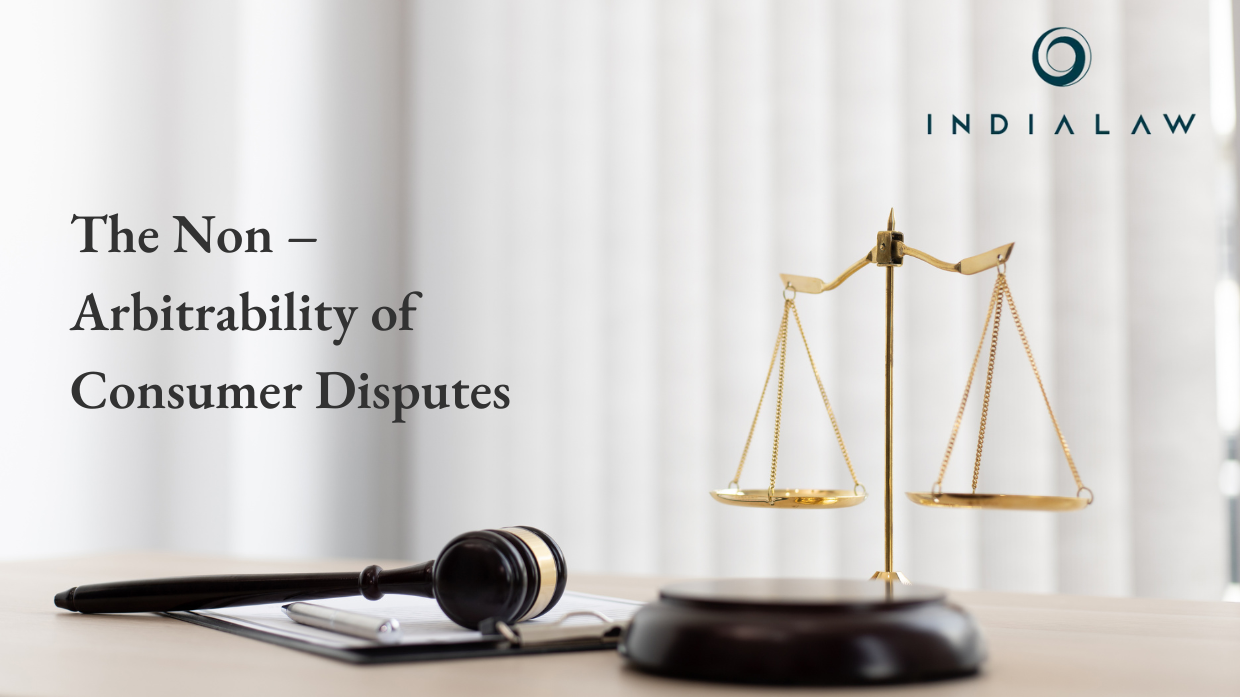The Non – Arbitrability of Consumer Disputes

In a recent decision[i], the Hon’ble Supreme Court (“SC”) has reiterated its stand on the non – arbitrability of consumer disputes under the present Indian dispute resolution regime. In doing so, the SC rejected an appeal presented by a builder (“Appellants”), challenging the decision of the Hon’ble Telangana High Court (“HC”) rejecting a review by the said Appellants of the HC’s own decision in rejecting an application by the Appellants under section 11 of the Arbitration and Conciliation Act, 1996 (“Arbitration Act”).
The genesis of this dispute begins with an Agreement for Sale (“AFS”) executed between the Respondent – Purchaser and the Appellants – Builders for the development and sale of a villa on a certain plot of land to the Respondent by the Appellants. Due to a termination notice having been issued by the Appellants to the Respondent, in respect of the aforementioned AFS, the Respondent had preferred a consumer complaint under the Consumer Protection Act, 2019 (“2019 Act”) before the applicable District Consumer Disputes Redressal Commission (“consumer forum”). On the contrary, the Appellants preferred an application under section 11 of the Arbitration Act before the HC; they were requesting, thereby, that an arbitrator may be appointed for the resolution of disputes between the parties, citing the arbitration clause in the AFS.
Vide an order dated 19.05.2022, the HC rejected such application for appointment of an arbitrator on the ground that the dispute was pending before a Judicial Authority (i.e., the consumer forum). Therefore, the Appellants ought to have exercised their option under section 8 of the Arbitration Act before the consumer forum. Accordingly, the Appellants preferred such an application under section 8 of the Arbitration Act before the consumer forum. The consumer forum dismissed such application, while relying on the landmark decision of the SC in Emaar MGF Land Ltd. v. Aftab Singh[ii](“Emaar MGF”), stating that an arbitration clause between parties will not oust the jurisdiction of a consumer forum.
The Appellants sought a review of the 19.05.2022 order before the HC. However, the same was dismissed by an order dated 25.11.2022 stating that the Appellants had already acted upon the earlier order and as such they were now hit by the doctrine of estoppel. Aggrieved by this latest rejection, the Appellants preferred the instant appeal before the SC.
The SC quite lucidly laid down that consumer disputes have been repeatedly held to be non – arbitrable in nature. The reasons for doing so are as follows:
- All disputes are not referrable to arbitration. The nature of certain disputes may be such that they should not be sent to arbitration. The same was laid down by the SC in Booz Allen and Hamilton Inc. v. SBI Home Finance Limited and Ors.[iii]. In this regard, consumer disputes are non – arbitrable in nature.
- Section 8 of the Arbitration Act is not to be used to oust the jurisdiction of consumer forums, under the Consumer Protection Act, 1986[iv] (“1986 Act”). The same was observed by the SC in Fair Air Engineers (P) Ltd. v. N. K. Modi[v]and National Seeds Corporation Limited v. M. Madhusudhan Reddy and Anr.[vi].
- The SC considered the scheme of the Arbitration Act vis – à – vis the 1986 Act in Emaar MGF[vii]. The conclusion thereby was that, the 1986 Act being a beneficial legislation in favour of consumers, there can be no compulsion to refer consumer disputes to arbitration under section 11 of the Arbitration Act despite the existence of a valid arbitration agreement.
In conclusion, the SC held that consumer disputes are non – arbitrable in nature. Judicial Authorities, which would include consumer forums and any other courts where applications for appointment for arbitrators are made, ought to reject any such applications in relation to consumer disputes. Finally, the consumer is the primary beneficiary of the 1986 and 2019 Acts. Thereby, consumers cannot be compelled to forego their remedies under the 2019 Act, even in a scenario where they have executed a valid arbitration agreement.
In the authors’ opinion, this decision would be extremely helpful for consumers in India. The consumers are always at liberty to exercise their rights to appoint an arbitrator, if they so choose to. However, consumers are also protected from the opposite party / service provider compelling them to submit to arbitration, if they are averse to the same.
[i] Smt. M. Hemalatha Devi and Ors. v. B. Udayasri [Civil Appeal Nos. 6500 – 6501 / 2023] (judgment dated 03.10.2023); The coram consisted of Sanjay Kishan Kaul and Sudhanshu Dhulia, JJ. The judgment was delivered by Sudhanshu Dhulia, J.
[ii] (2019) 12 SCC 751.
[iii] (2011) 5 SCC 532, pp. 35 – 36.
[iv] Though the 1986 Act is now repealed, by virtue of the 2019 Act, the SC was of the opinion that this would not make any difference as the basic purpose of both legislations remains primarily the protection of consumers and providing them with an easy and inexpensive redressal mechanism for consumers’ grievances.
[v] (1996) 6 SCC 385, p. 16.
[vi] (2012) 2 SCC 506, pp. 64 – 66.
[vii] Supra note ii.
By entering the email address you agree to our Privacy Policy.



